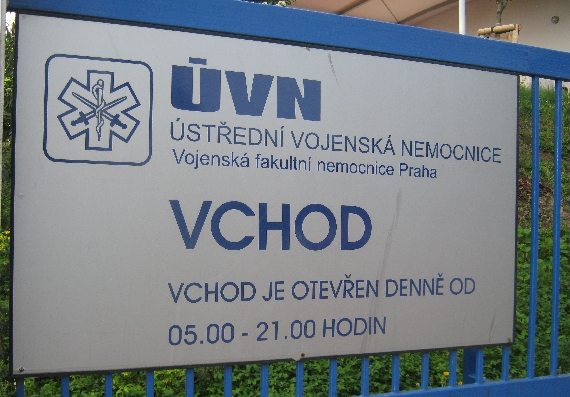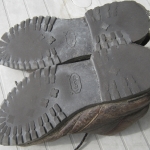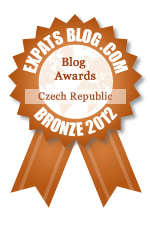On Wednesday 30th April, I paid my fifth visit in the last nine months, to see a Czech dermatologist at Vojenská Nemocnice, the Military Hospital here in Prague. It prompted me to think that I really ought to write a blog post all about my experience, along with a brief explanation as to how the Czech Healthcare System works. But first a bit of background about me.
Between July 1970 and February 1975, I lived and worked in Australia. During my time there, I got badly sunburnt on several occasions and have since suffered from the consequences of being a pale, white, north-European, who exposed himself to far too much Australian sun.
It took nearly twenty years before I first experienced the unwanted consequences of my unwise actions. It was in 1988, whilst I was training for ordained ministry at Wycliffe Hall, Oxford, that I eventually went to see my GP about a scab, located on the hairline of my forehead, that refused to heal up. The GP sent me to see a dermatologist, who promptly diagnosed it as a Basel Cell Carcinoma (BCC), the commonest, but fortunately least dangerous, form of skin cancer.
Unfortunately, by that stage, it had become too big to be cut out under local anaesthetic, with a couple of stitches to pull the resultant wound together. Instead, the BCC had to be removed under general anaesthetic, with a skin graft taken from my chest, put across the gaping hole on my forehead. The evidence of that operation is still visible today, all the more so because my hairline has receded much further in the subsequent twenty-six years.
Ever since that operation in September 1988, I have kept a very watchful eye on any scab or spot on my face that refuses to heal up and promptly sought medical advice. As a consequence, over the years I’ve had several more small BCCs cut out under local anaesthetic. During the latter years of my time living in the UK, my BCCs were usually ‘frozen off’, by being treated with liquid nitrogen which destroys the cancerous cells.
During my first few years in Prague, I was pleased that I could not see any visible signs of further BCCs on my head and face. However, in the Spring of 2013, a tell-tale non-healing scab appeared on my current hairline, on the right side of my face. I also observed several smaller spots, all of which looked ominous. So in early June last year, I finally took myself off to see my GP, Dr Adriana Youngová.
Dr Youngová is a fluent English-speaking Czech, helped no doubt by being married to an Englishman called Mr Young, hence her unusual surname. Interestingly, although she has taken the Czech genitive form of Youngová, she calls the medical practice she heads, ‘Young & Co‘, without the ‘ová’ 🙂 But I digress.
Dr Youngová immediately agreed that I almost certainly had a BCC and promptly wrote a letter of referral for me. She recommended that I see a dermatologist at the Military Hospital as she knew that many of the medical staff there, spoke English. However, unlike in the UK, where your GP sends your letter of referral to a hospital and the hospital then writes back, giving you an appointment, in the Czech Republic, the patient has to contact the hospital themselves and make their own appointment.
I therefore went in person to the Military Hospital in order to make my first appointment. I could just have telephoned, but realised that if language was going to be a difficulty, which it was, you cannot make hand signals over the phone 🙂 Surprisingly, the young female receptionist on the main hospital entrance, spoke better German than English, and successfully directed me ‘auf Deutsch‘, to the building where the dermatology department is situated. However, the receptionist in the dermatology department itself, only spoke Czech, so I was most glad that I had not tried to phone. Eventually, my limited Czech, combined with appropriate hand signals, got me my first appointment for 15th July 2013.
As is required under Czech law, as an employed person, I and the Church as my employer, make contributions each month, to VZP CR, who in turn provide me with full medical cover under the Czech public health insurance scheme. VZP CR in turn, issue me with a European Health Insurance Card (EHIC) which I show in order to receive, almost free medical care.
I say ‘almost free’ as, on each occasion you visit your GP or have a hospital appointment, you are required to pay CZK 30 (just under £1.00 or US$1.50). On entering the dermatology department, there is this machine in the entrance hall, into which you put your CZK 30 and obtain a printed ticket, showing you have paid up. This is then retrieved from you, when you see the dermatologist.
My appointment yesterday, like a couple of previous ones, was for 08.00. This is very Czech as there is quite a tendency here to begin work early in the day. I first went to the machine to obtain my CZK 30 ticket. There was a delay whilst an elderly Czech lady in front of me, slowly managed to recover her coins, having first pushed them into the slot where the ticket comes out! I felt a certain sense of satisfaction that I understood the instructions on the machine, better than did a native Czech!
Then it was on to reception, to confirm my arrival. This receptionist is a classic example of what I have previously described as how to dress Czech. She regularly wears tops that reveal a large amount of cleavage. As I’ve previously written, it is look that would be appropriate for a romantic dinner with her husband or boyfriend, but not what I really want to see at 08.00 in the morning, in advance of being attacked with liquid nitrogen. Fortunately, the top on Wednesday, was somewhat less revealing than a couple of the previous ones 🙂
Once my arrival had been confirmed & the receptionist had found my file, I had to wait in the adjacent waiting room, until summoned. For the first time yesterday, I was summoned by a nurse who could actually pronounce my surname. My surname of ‘Yates’, causes great problems most of the time, as no Czech surname begins with the letter ‘Y’!
I saw the same young female Czech dermatologist that I’ve seen on four of my five visits. She speaks fluent English and has a helpful and friendly manner. She agreed with me that the original large BCC on my hairline, has still not completely disappeared, despite four previous treatments with liquid nitrogen. However, she was convinced that it was now much smaller and that one further treatment might finally do the trick.
So it was out with what I would describe as a cotton bud on the end of a large stick, first placed into the flask of liquid nitrogen, and then dabbed firmly on the offending area, several times over. She also treated a new spot I had identified, alongside my ear on the other side of my face. After treatment, she dusted both with a white antibiotic powder which does leave me looking slightly ghostly.
Having received treatment, I was duly given my next appointment for two months time at the end of June, along with a written report about my treatment, all in Czech! Then it was back to the tram for my journey home.
In conclusion, I have to say that I have been most impressed by my experience of the Czech Healthcare System. It is effective and efficient and gives an excellent level of care. Even as a foreigner, once you get to know the basics as to how the system works, then you should not have any real problems or concerns. And because most well-educated Czechs, especially the younger ones, speak reasonable English, language is usually not a problem with many doctors or with some nurses.









On the other hand, a friend recently shared a rather scary story about a burn and having to travel from one hospital to another because they told him they did not treat burns… I think it depends on the hospital somewhat and the one he had at hand was unfortunately one of the worse ones.
Good to hear you’ve had a good experience; we tend to grumble about our healthcare system, but we’ve been told by our interpreting teacher, very firmly, that the British system was far worse in terms of making an appointment in the first place. 😀
I’m sorry to hear of the problem your friend had Hana, regarding getting treatment for a burn. I can only write out of my own experience & from paying pastoral visits to English-speakers who have been hospitalized here. The only consistent complaint from those who have been in-patients is always about the poor quality of the food that is served 🙁
I often think that many Czech people don’t appreciate how good things are here, in healthcare & in other aspects of life too. Whilst overall, the British National Health Service is very good, what your teacher says is also true. There can be quite a time delay to getting a first appointment, particularly in certain specialities.
It’s great you got that taken care of so quickly–the doctors sound like they were pretty thorough.
I completely agree–the medical system here is pretty darn good. The health care is on par with the West (Britain, the States, etc.). I have an excellent GP and allergist–both of whom speak excellent English. I have the health insurance for foreigners and can’t complain one bit.
The only problem I’ve had with the Czech medical system was when no one was willing to look further to see why I couldn’t walk without a cane and an agony of pain 2 or 3 years ago. After 9 months, the system said there was nothing more they could do for me. At that point I went back to the States, where it took them a long time to figure out what it was–a complex labral tear with arthritis and bone issues on the pelvis and femoral head–in addition to some back and nerve damage issues.
Other than this incident I’ve been very happy with the Czech health care system and have had excellent treatment.
Thanks for this comment Sher, especially for leaving it here as well as what you wrote on Facebook. I’m glad to hear that your experience of the Czech Healthcare system has been as good as mine, with the one exception you mention. Your FB comment mentioned the massive contrast between the USA & the CR with regard to the cost of medication. Somebody, somewhere in the USA, is making a highly unjustifiable profit!
I had national healthcare here years ago and loved it. Far more preventative and holistic than in the US. In the US, as a public school teacher, I had affordable individual coverage costs… but when I got married I tried to add my husband, and they wanted $900 a month for his coverage! Absolutely ridiculous. He had wimpy health insurance through his work and just avoided going to the doctor, which, as your story points out, could have potentially disastrous effects. Now I’m on BUPA and am finding that the Czech national health insurance scheme covers more; I think it’s a pretty good system.
Anyhow, glad to read you’re following up on the BCC! Good for you!
Glad to have another endorsement for healthcare here in the Czech Republic. Thanks Emily! You are quite right in saying that the system is also preventative. When I first registered with my GP practice, they insisted on a complete check up taking blood & urine samples etc. I had an email a couple of months ago, reminding me that it is two years since this was last done & to make an appointment for a further check up. Something I must do 😉 As for insurance & healthcare (or the lack of both for some people), in the USA, I shall refrain from saying anything to avoid starting a major political argument!
I’ve always been impressed with Czech health care and how easy it is for visitors to receive emergency low-cost or free care. The reference to the health care “scheme” caught me up for a moment (ever since I first encountered a church pamphlet outlining a planned-giving “scheme”) as that particular word has such negative connotations in American English!
Likewise Stephen – I’ve occasionally made a hospital visit to see an English-speaker taken ill whilst here as a tourist & the person concerned is always full of praise for the care they’ve received. However, I was totally unaware that the word ‘scheme’ had negative connotations in American English. Is there an explanation?
In American English , a scheme is a devious, underhanded plot to gain the schemer something he is NOT entitled to have.
“mid 16th century (denoting a figure of speech): from Latin schema, from Greek (see schema). An early sense was ‘diagram of the position of celestial objects,’ giving rise to ‘diagram, outline,’ whence the current senses. The unfavorable notion “plot”arose in the mid 18th cent.”
Thank you for answering my question, Stephen. However, my American Heritage College Dictionary, (given to me by an American friend), does give one definition of ‘scheme’ as ‘an orderly combination of related parts’ which is the meaning with which I was using the word.
Dueling definitions 🙂 Both are correct! I’ve lived in different parts of the US and know what Stephen’s saying. It can mean an underhanded plot. And Ricky’s also correct–it can also mean an orderly combination…etc.
If you look at Merriam Webster’s dictionary online, you’ll find both of these definitions: http://www.merriam-webster.com/dictionary/scheme
Actually, when I read your post, Ricky, “scheme” also jumped out at me, but I’m used to the term being used in a positive or negative way. The context determines the definition.
Thank you Sher – It is used in both ways in British English. Someone can be described as a ‘schemer’ usually meaning that they’re up to no good. As rightly say, the context determines the definition.
Sorry to hear that your BCC is playing up again and I really hope this treatment is doing the trick. It was interesting to hear how the Czech health service works and see the differences and similarities between it and the NHS. My only experience of a foreign health service was in 1966 when I was working over the summer vacation in Hamburg and got appendicitis. Luckily my work meant I was fully insured and I was treated very well and promptly.
It’s not my original BCC playing up, Perpetua, but the occurrence of new ones, one of which has proved somewhat reluctant to depart 🙁 Lets hope that this last attack of liquid nitrogen does the trick. Yes – it is interesting to see both the similarities & differences with the NHS. As long as you understand how the Czech system works, then it is both efficient and effective.